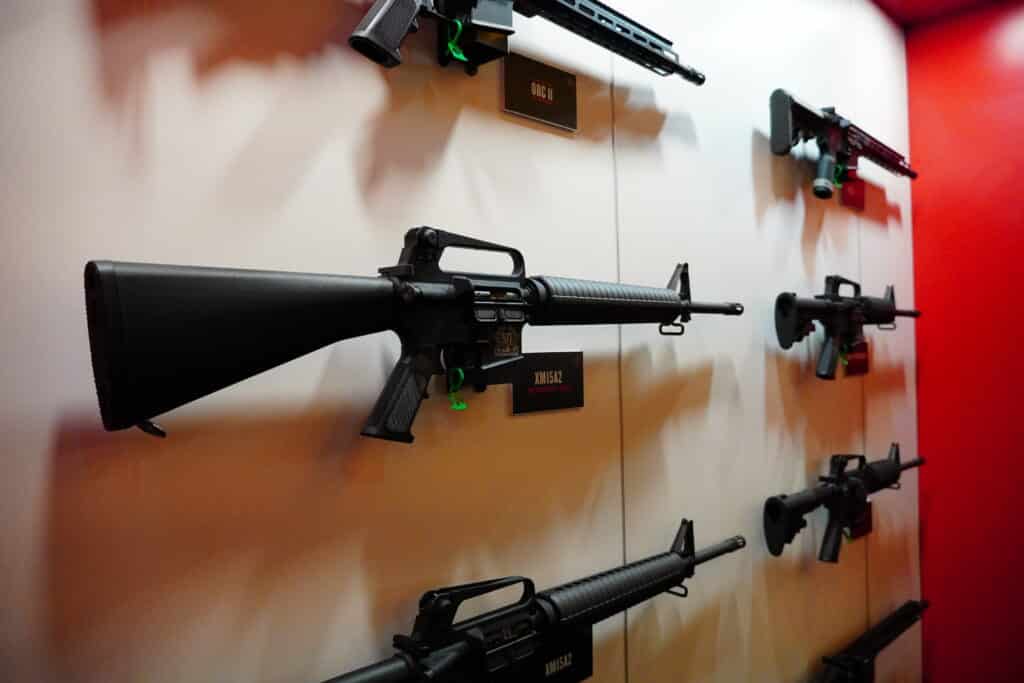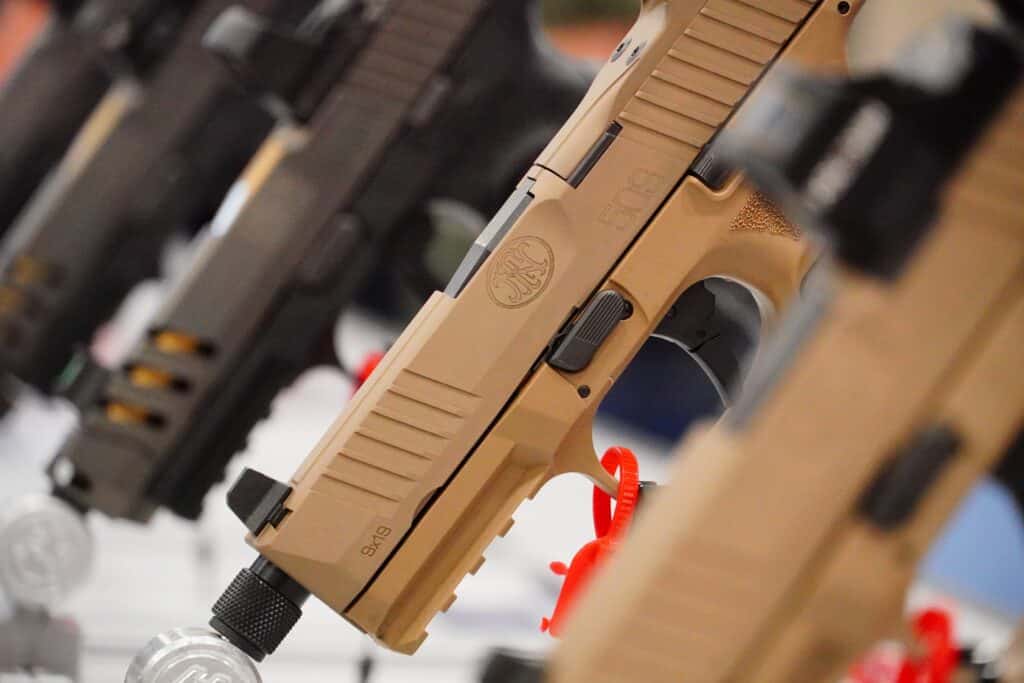A lot happened on the national scene this week, and we’ll get to that of course, but there was also a major development in one state’s gun laws.
Massachusetts lawmakers passed a slew of new firearms restrictions. The most significant changes involve codifying Governor and former Attorney General Healey’s unilateral move to outlaw “copycat” guns that fall under the state’s “assault weapons” ban. But it also expands the definition of “assault weapons” with a few oddly written exemptions.
Contributing Writer Jake Fogleman dives into the details of the new law.
Looking back to the national scene, I explore whether or not Kamala Harris is likely to move the Democratic campaign further to the left on gun policy. Plus, National Review’s Charles Cooke joins the podcast to give his view of how Harris will change the gun dynamics of the 2024 race.

Analysis: What the New Massachusetts Gun-Control Law Does [Member Exclusive]
By Jake Fogleman
After more than a year of effort and two failed prior attempts, Bay State lawmakers officially got a Bruen-response bill enacted into law this week.
Massachusetts Governor Maura Healey signed H.4885 into law on Thursday. The signing ceremony was the culmination of several months of negotiations between gun-control advocates in the state’s House and Senate after previous bills died in the legislature.
Clocking in at 116 pages in length, there are few realms of firearms regulation that the measure doesn’t touch. Here’s a look at what some of the most significant changes in H.4885 will mean for Massachusetts gun owners.
“Assault-Style Firearms” and Magazine Restrictions
The new law expands the state’s already extensive prohibition on so-called assault weapons by broadening the definition of which guns are included under the ban. Under H.4885, “no person” shall “possess, own, offer for sale, sell or otherwise transfer” an “assault-style firearm” or “large capacity feeding device.”
The law defines an assault-style firearm as any semiautomatic centerfire rifle or semiautomatic pistol capable of accepting a detachable magazine that also has two or more cosmetic or ergonomic features typically associated with assault weapon bans. They include things like folding or telescopic stocks, forward grips, threaded barrels, and barrel shrouds. The law also applies to any semiautomatic shotgun, regardless of whether they accept detachable magazines, if they contain two or more of the banned features.
In addition to the newly-added features-based test, the law carries over the ban on dozens of specific firearms by make and model, as well as any firearm listed on the state’s “assault-style firearm roster,” which the state’s Firearm Control Advisory Board is tasked with maintaining and updating at its discretion. The law also allows anyone to petition the board to add or remove firearms from the roster. Furthermore, the law bans any “copy or duplicate” of a firearm listed in the statute or on the assault-style firearm roster.
There are a handful of exceptions to the law’s possession ban, however. Those who possessed an assault-style firearm prior to August 1, 2024, registered the weapon with the state, and have a valid license to carry are grandfathered in. As are those who legally purchased what the state labels copies of banned guns before July 20, 2016–the day Governor Maura Healey (D.), who was Attorney General at the time, announced she was re-interpreting state law to bad the guns.
Large-capacity feeding devices—defined by the law as any fixed or detachable magazine, drum, or belt capable of holding more than 10 rounds of ammunition or more than 5 shotgun shells—are completely banned unless they were previously owned before September 13, 1994.
Carry Restrictions and Permitting Requirements
While ostensibly a Bruen-response bill, H.4885’s restrictions on gun carry are less onerous than the response bills passed in other formerly may-issue states. It creates new “prohibited areas,” similar to the sensitive places crafted in other bills. However, it limits them to state, county, and municipal government property as well as within 150 feet of any polling place.
H.4885 also adds new training requirements for people seeking a license to carry. The law tasks the colonel of state police with crafting uniform safety training standards that must include both a written and live fire exam. Courses must also cover “the safe use, handling and storage of firearms; methods for securing and childproofing firearms; the applicable laws relating to the possession, transportation and storage of firearms; knowledge of operation, potential dangers and basic competency in the ownership and use of firearms; injury and suicide prevention and harm reduction education; applicable laws relating to the use of force; disengagement tactics; and live firearms training.”
Those with valid carry licenses issued prior to August 1, 2024, are exempt from having to go through the updated training requirements when renewing their licenses. The law maintains the state’s current $100 application fee and six-year validity window for permits.
“Ghost Gun” Bans
In an attempt to crack down on so-called ghost guns, the law prohibits the possession, manufacture, transfer, and sale of any unserialized firearms made after 1968. It does allow persons otherwise allowed to purchase and possess firearms to continue privately manufacturing them, provided that they are not “assault-style” firearms and that persons serialize them with the Department of Criminal Justice Information Services within seven days.
The law prohibits anyone from using a 3-D printer or CNC machine to make a firearm unless they have a valid license to carry. It also prohibits the sale of any 3-D printer or CNC machine that has “the primary or intended function of manufacturing or assembling firearms,” which will apparently be determined based on the machine’s marketing and promotion.
“Machinegun” Restrictions
The law updates the state’s existing prohibitions on machineguns by also criminalizing the possession of “automatic parts,” defined as any “device, part or combination of parts” capable of being attached to a firearm that “allows for the automatic discharge of more than 1 shot with 1 continuous activation of the trigger” or that “increases the rate of fire of a firearm to mimic automatic fire.” The bill lists bump stocks, rapid-fire trigger activators, and trigger modifiers like cranks and binary triggers as falling under that definition. The bill specifically exempts adjustments made to the trigger pull weight of a firearm, though.
Extreme Risk Protection Order Expansion
H.4885 significantly expands the categories of people eligible to petition a judge to initiate Massachusetts’ existing emergency gun confiscation law.
Previously, only family members or law enforcement were permitted to request an extreme risk protection order.
The new law will now allow licensed physicians, registered nurses, licensed practical nurses, certified nurse practitioners, certified clinical nurse specialists, certified psychiatric clinical nurse specialists, licensed psychiatrists, licensed psychologists, licensed mental health counselors, licensed marriage and family therapists, licensed independent clinical social workers, licensed certified social workers, a principal or assistant principal of an elementary school or secondary school, and administrators of a college or university where the respondent is enrolled to file petitions.
Miscellaneous
The law also tasks the state legislature with convening a special commission to “study and investigate emerging firearm technology.” Specifically, the 13-member commission will be required to study the “status, feasibility, and utility” of smart guns and microstamping technology, including the cost and impacts associated with “requiring” their use in Massachusetts. The law directs the commission to complete its study and issue legislative recommendations no later than March 1, 2025.
Additionally, the 116-page law is littered with new administrative record-keeping, information disclosure, and training requirements for firearms retailers and various state agencies.
Overall, the bill is much less akin to the Bruen-response laws gun owners have grown accustomed to seeing in states like California and New York, and much more like a grab bag of various gun control policy goals. It will likely prove to be just as prone to legal challenges from gun-rights advocates, though.
Podcast: National Review’s Charles Cooke on How Kamala Harris Shakes Up 2024 Gun Politics [Member Early Access]
By Stephen Gutowski
Another week, another wild series of events in the 2024 presidential race. This time, the Democratic ticket was entirely upended, and Kamala Harris all but wrapped up her position at the top.
To discuss how this affects gun politics, we’ve got National Review’s Charles Cooke back on the show for the first time in a while. Cooke said that Harris has been to the left of her predecessor, Joe Biden, on firearms restrictions. He noted she supported a more assertive approach to using executive power, and she backed a mandatory buyback of AR-15s.
However, Cooke argued Harris probably wouldn’t track further left on guns during the campaign. He said the incentive is to either stick with the already aggressive platform, centered on an “assault weapons” ban, or try to moderate. He said Harris is likely going to have to combat her image as a very liberal California politician if she wants to beat Donald Trump.
He said he was less concerned about Trump backing away from gun policy in recent weeks. He argued Democrats are highlighting the issue to try and excite voters they’re concerned won’t show up to the polls whereas Republicans don’t have to worry as much about that because they’ve already accomplished a lot of pro-gun priorities in recent years.
Oh, and we talked a little bit about rollercoasters at the end for those interested lol.
You can listen to the show on your favorite podcasting app or by clicking here. Video of the episode is available on our YouTube channel. An auto-generated transcript is here. Reload Members get access on Sunday, as always. Everyone else can listen on Monday.
Claim your free 30-day trial at this week’s sponsor The Dispatch here!
Plus, Contributing Writer Jake Fogleman and I talk about Kamala Harris’ new role at the top of the Democratic ticket. We also cover the latest political fundraising totals of the major gun groups and what they say about the relative stature of gun rights and gun control organizations. Finally, we wrap up with a rundown of the latest public remarks from the NRA’s new executive vice president, a federal judge’s decision to block the ATF’s ban on Forced Reset Triggers, and a novel AI-based gun detection technology set to make its debut in the New York subway system.

Analysis: Will Kamala Harris Move Her Campaign Left on Guns? [Member Exclusive]
By Stephen Gutowski
In under a week, Kamala Harris has all but completed her swap to the top of the Democratic ticket.
On Sunday, President Joe Biden announced he was dropping out of his reelection campaign and endorsing Harris instead. Within a few days, she collected most of the remaining big-name endorsements as well. She also took over the reins of Biden’s campaign.
Where she steers that campaign remains to be seen, though. Harris ran to the left of Biden on a number of issues during the 2020 primary campaign, including gun policy. But will she bring those more stringent views on gun control to the 2024 general election?
Biden and Harris aren’t miles apart on firearms. They’ve both backed many of the same policies over the years. The main difference is in degree.
They both opposed the Supreme Court’s landmark 2008 finding that the Second Amendment protects an individual right to keep and bear arms, but Harris signed on to a brief in the case as California Attorney General. They both back a so-called assault weapons ban and buyback, targeting popular guns like the AR-15. However, Harris has also advocated for the government to force owners to sell their firearms. The two also back using executive power to unilaterally implement new gun restrictions but clashed over the extent of that power.
“Upon being elected, I will give the United States Congress a hundred days to get their act together and have the courage to pass reasonable gun safety laws,” Harris said at a 2019 CNN town hall. “If they fail to do it, then I will take executive action.”
“You have no constitutional authority to issue that executive order, the ones they’re talking about. ‘I’m going to eliminate assault weapons’ — can’t do it by executive order any more than Trump can do the things he’s saying he can do by executive order,” Biden responded in a press conference a few months later.
With Biden besting Harris and picker her as his Vice President, the subsequent Biden-Harris Administration hued closer to his preferences than hers. The same has been true for Biden’s now-defunct 2024 reelection campaign. While Biden was already on track to run on the most aggressive gun-control platform since the 1990s by centering it around an assault weapons ban, he hasn’t pushed for the mandatory buyback scheme Harris backed in 2020.
In her early efforts since taking over the campaign, Harris has kept to the Biden script. She has kept the focus on guns with mentions in both of her first two campaign speeches and her first ad. But she hasn’t expanded her policy promises beyond what Biden was already touting.
“That’s why we will work to pass universal background checks, Red Flag laws, and an assault weapons ban,” Harris said in her first campaign speech.
She has yet to revive her mandatory buyback or plan to ban AR-15s via executive order. And there’s reason to think she won’t go in that direction.
For one, Harris took her most aggressive policy positions on guns during a primary where most of the field was trying to track to the left of one another. But now she’s running as an underdog in a close general election. Once the relative shock of the last two weeks of wild campaign developments wears off, she’s likely going to be battling against a concerted Republican effort to define her as too liberal in the public eye.
On top of that, early polling indicates voters actually prefer former President Donald Trump’s handling of gun policy to Kamala Harris. While Trump can no longer legally own guns since his felony convictions and he’s gone silent on gun policy in recent weeks, 40 percent of adults said he would do better with firearms, according to a YouGov poll published on July 22nd. Just 34 percent said Harris would do a better job.
So, Harris has several good reasons to shy away from a further left turn on the issue or ratchet things back a few clicks toward the center.
Of course, the tight nature of the race could lead the Harris Campaign to double down once more on the gun issue. Biden was already in the process of ramping up the focus on gun control in an apparent attempt to reenergize the Democratic base. Maybe Harris decides that’s still the right direction to travel, even if her ascension to the top of the ticket seems to have solved some of the party’s enthusiasm problem for now.
Her Vice Presidential pick will provide some key insight into what the campaign, which appears to be sticking with most of Biden’s top strategists, is thinking.
And there’s little reason to think she wouldn’t govern to the left of Biden on guns if she does win the election, regardless of how the campaign unfolds. The Biden Administration has called on Congress to ban AR-15s, and it’s used executive rulemaking to ban things like pistol-braced firearms or homemade gun kits. However, it has not tried to use executive rulemaking to ban AR-15s or released a plan to confiscate them in a mandatory buyback.
A Harris Administration might go that far. But the Harris Campaign is unlikely to run on doing so.
That’s it for now.
I’ll talk to you all again soon.
Thanks,
Stephen Gutowski
Founder
The Reload







